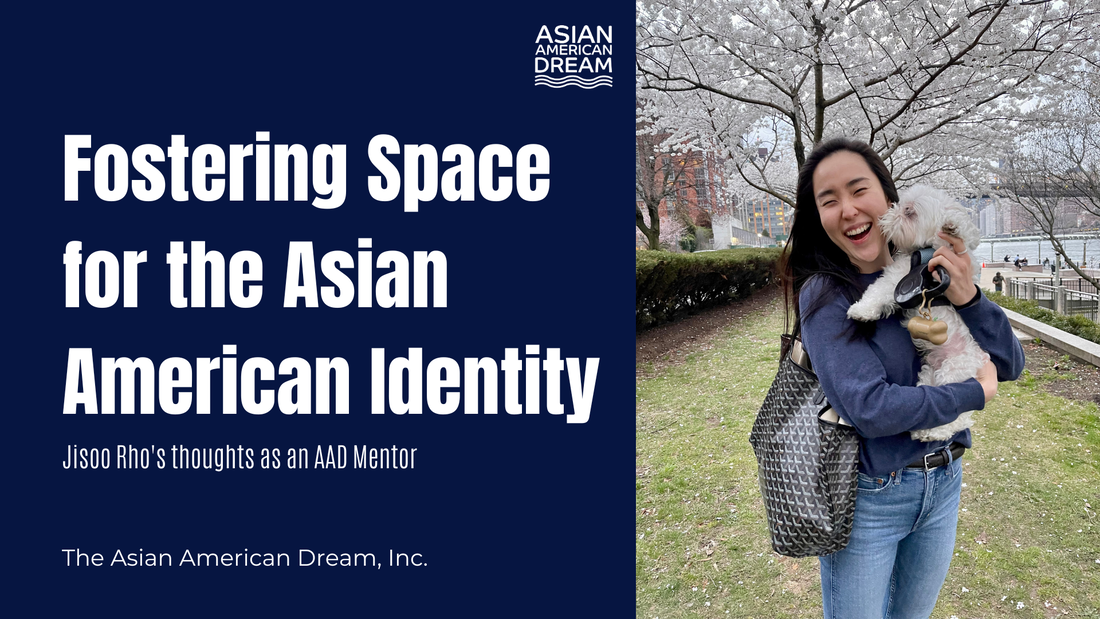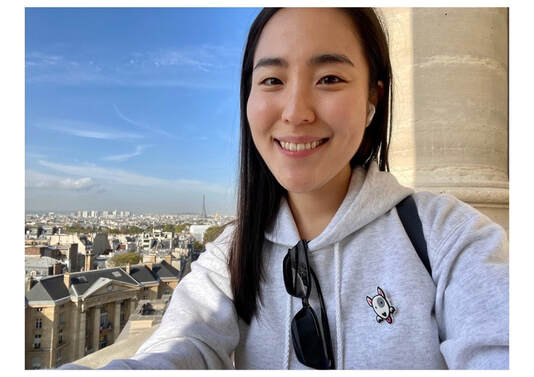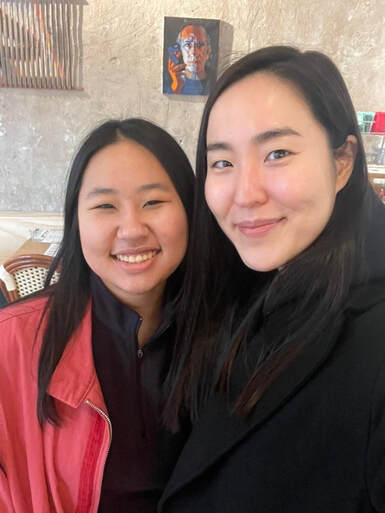|
Monday, July 10th, 2023 By: Sylvia Yang A person’s values can guide difficult choices, determine suitability for a company fit, and make or break a relationship. One might even say knowing someone’s values summarizes who they are as a person. Since our values affect how we carry ourselves, it undeniably influences the way mentorship and guidance are provided. For Jisoo Rho, an Asian American Dream (AAD) mentor, the importance of keeping an open mind is a standard she holds for herself and hopes for her mentees. At the early age of five, Jisoo’s family immigrated to the U.S. from Korea, and she has since called New York City her home base. This is also where she currently works with A+E Networks on their digital video monetization strategy for the A&E brand. Earlier this year in 2023, Jisoo decided to try her hand at being a mentor with AAD’s Q1 Kin Mentorship Program. She was first introduced to AAD through her friend Scott Xu, a fellow AAD mentor, who also applied for the mentorship program through another friend’s recommendation. Jisoo recalls how while she was in college, there were limited mentorship programs available for the Asian American community. Thus, she wishes to help build the community as an Asian American herself, and her goals aligned with AAD’s mission in providing the foundation and support for the younger underserved generation. “I didn’t have anything when I was growing up and being able to provide that for someone else was a meaningful thing to me.” – Jisoo Rho Jisoo in Paris, France in October 2022 While Jisoo professes she may not have thirty to forty years of experience that one may typically envision a mentor to possess, she and other AAD mentors hold the unique position of being in a similar age group with their mentees. She can relate to her mentees and share her testimony from a more recent standpoint, an important detail since career prospects are constantly changing, which might be more in line with what her mentees are experiencing. Just as her mentees are still maneuvering their way through the world, Jisoo is also at a time in her life where she is far from settled yet. She hopes being transparent in her own journey normalizes the idea that “no one has it figured out,” considering how daunting entering the workforce full of professionals, and seemingly seasoned individuals, might be for young college students. Jisoo also finds herself learning from her mentees’ perspectives and, through this, accessing what the younger generation has in mind. Recognizing how easily living her day to day can result in getting caught up in her own world, she observes how connecting with her mentees is “refreshing” and has opened her eyes a little more regarding what they are thinking, what they are struggling with, and what the job market is looking like. She further mentions that connecting with her mentees and their current state of mind “allows me to challenge my ideals and my views and perspectives,” especially since “it’s a whole different ballgame now versus when I was in school.” At first, Jisoo was slightly nervous about her new role, responsibly noting “if I was going to be part of the program, I wanted to give whatever I can and be the best mentor that I can be.” As someone who has never had a mentor and signed up as a mentor herself for the first time with AAD, she did not know what to expect and how the matching process would occur. Now reflecting on the first quarter, she says she is thankful for the mentees she was introduced to and their communicativeness throughout the program. Overall, she has enjoyed her time as a mentor and in being a part of AAD’s development process. Furthermore, Jisoo appreciates Kevin and Mathea, AAD’s Founder and Program Director respectively, for their open mindedness as demonstrated by their reception to feedback and openness to change. For future mentees, Jisoo drops the advice to come eager to learn. Although a mentor might not have experience that strictly aligns with what a mentee would like to go into, they can still provide support in other areas “that might surprise you or even connect you with people in their network that might be really helpful to you.” Additionally, learning about a mentor’s unique experience will also expose mentees to new ideas and even successfully present a different perspective to consider. She also highlights that the mentor-mentee relationship is a two-way street, where actively participating can help mentees really own their experience and time with AAD. Thinking back on her own time in college, Jisoo thought she would be graduating and doing a job she set her heart on. However, although she earned her undergraduate degree in Classical Music Performance, she ended up not doing something related to entertainment, communications, business, or marketing as she expected. Moreover, after going into the field and assimilating into the working environment, she realized she only knew 1% of the pie back then. She did not even know her current job existed and continues to be surprised by experiences that people share regarding roles she was not previously aware of. Jisoo adds the reminder for current students that the job market will continue to evolve, where current positions will transform and new ones will open. There is no set way to prepare for these developments but to “have an open mind and be willing to change” in order to “adapt to the ever-changing market.” Although the entire Kin Mentorship experience was virtual, Rebekah, one of Jisoo’s mentees, visited New York City with her friends over spring break and they were able to grab coffee together. Even though they had one on one meetings throughout Q1, it was an entirely different experience to meet in person and Jisoo felt they were able to get more comfortable with each other. Jisoo with her mentee Rebekah Choi in NYC, March 2023 Besides her mentees, Jisoo has also had the opportunity to get to know other mentors residing in New York City with a “similar dream and aspirations” as young Asian Americans. Growing up, she did not know Asian American young adults living the corporate life, as most immigrant parents were not working white collar office jobs due to factors such as language barriers. Jisoo is thankful that with AAD, she has the opportunity to “help build a foundational Asian American community and resource for college students that might not have this kind of opportunity elsewhere in their current community.” In many ways, Jisoo and other AAD mentors are filling in a gap with the extra support that they may not have had themselves.
Recalling her past, she comments “my family we came to the states, and we struggled,” which put financial stability at the forefront of her mind as a child. However, experiencing life as an adult, and viewing the Asian community in a new light, has changed her focus from just building wealth to “tying in a cultural background piece.” Now she also tries to create space for her Asian American identity, such as focusing on “getting to be an Asian American in a leadership role or being an Asian American in the community that has the financial stability to give back to the community and to be a resource to others.” Jisoo feels her Asian American dream has expanded beyond her to also include the community as a whole. While speaking about big dreams and goals, Jisoo also brings in the conversation regarding mental health as an important aspect of the Asian American community. During the pandemic she did a lot of introspective work when she was forced to stay in and sit with herself. She grew up with the work hard and grind mentality, and the lockdown gave her a moment to pause by breaking her out of her usual routine. She has since allowed herself to explore her mental health more deeply, and finds it empowering to be able to delve into vulnerability at her own pace and discretion. Tending to mental health can not only help a person maintain it but also help them flourish. Jisoo recognizes that people tend to de-prioritize themselves in order to prioritize others, particularly within the immigrant community, when a personal decision might not just affect someone but also their entire family. Questions that Jisoo makes sure to pause and ask herself now are “is this what I want, or am I happy, or am I okay.” Through her own introspection, Jisoo has become more sensitive to the idea that there are no right or wrong answers when it comes to mental health, especially when everyone’s situations and experiences are so different. She has also come to the understanding that “people make the best choices that they can in that moment.” These perspectives have increased Jisoo’s empathy towards others in the Asian American community and beyond. Now, she emphasizes “one of the biggest things that I prioritize as an Asian American is to make sure mental health is always taken into consideration.” Jisoo stresses “it needs to be something that’s frequently talked about and it needs to be normalized,” as a strong mental foundation is necessary to keep going and succeeding in the long run. Mental health is still a fairly new concept and “not heard of as much in the community,” so she tries to promote this change for others as an Asian American adult in her generation. Jisoo intentionally brings in this mindset as someone who is part of the community and space, whether it is for herself, her mentees, or others she sees in passing. Comments are closed.
|
AuthorsDorothy Chan Archives
July 2023
Categories |
AAD is a 501(c)(3) nonprofit organization
Federal Tax ID: 87-1056467
© The Asian American Dream, Inc. All rights reserved.
Federal Tax ID: 87-1056467
© The Asian American Dream, Inc. All rights reserved.



